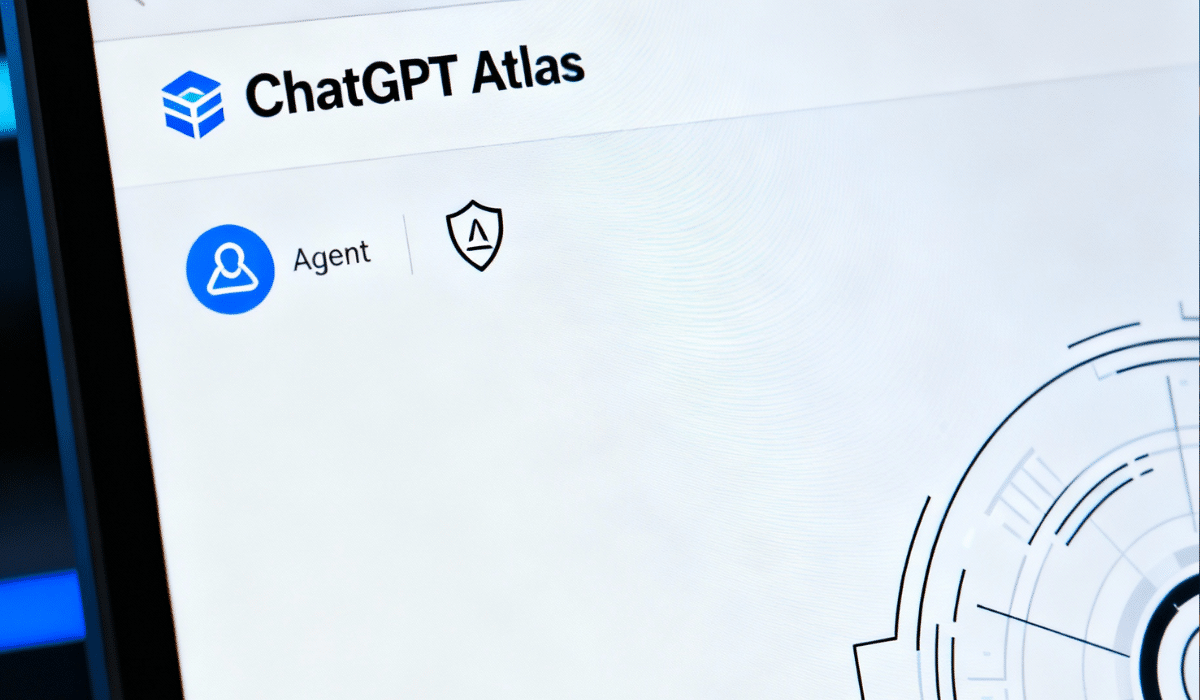ChatGPT Atlas browser has officially launched on October 21, 2025, marking OpenAI’s ambitious entry into the competitive web browsing market. The AI-powered browser introduces revolutionary features like autonomous agent mode and browser memories, but cybersecurity experts have raised serious concerns about prompt injection vulnerabilities that could expose sensitive user data.
What Is ChatGPT Atlas Browser and Its Key Features
OpenAI Atlas represents a fundamental shift in how users interact with the internet, integrating ChatGPT directly into the browsing experience rather than offering it as a sidebar tool. The browser includes “browser memories” that allow ChatGPT to remember which sites users visit, how they interact with content, and context from past browsing sessions to provide increasingly personalized responses.
The most revolutionary feature is agent mode, an experimental capability available exclusively to Plus, Pro, and Business subscribers. This autonomous AI agent can open tabs, read content, fill forms, navigate websites, and complete multi-step tasks on behalf of users—from planning trips and booking hotels to researching products and comparing prices across multiple sites.
The official launch positions this as one of the most significant developments in AI tools for everyday web browsing, fundamentally changing how users accomplish online tasks.
Browser Security Vulnerabilities Discovered Within 24 Hours
Within hours of the AI browser launch, cybersecurity researchers demonstrated successful prompt injection attacks against the platform. These attacks involve malicious instructions embedded in webpages that can manipulate the AI agent’s behavior without users realizing it.
One researcher demonstrated “clipboard injection,” where hidden code embedded in website buttons overwrites users’ clipboards with malicious phishing links. When users later paste content normally, they could be redirected to harmful sites and have sensitive login information stolen, including multi-factor authentication codes.
UC London professor George Chalhoub explained the fundamental risk: “It collapses the boundary between data and instructions. It could turn an AI agent from a helpful tool into a potential attack vector—extracting all your emails, stealing personal data from work, logging into your Facebook account and stealing messages, or extracting passwords.”
OpenAI Acknowledges Prompt Injection Attacks as Unsolved Problem
OpenAI has publicly acknowledged that prompt injection attacks remain “a frontier, unsolved security problem” according to Chief Information Security Officer Dane Stuckey. The company’s official documentation warns that “agents are susceptible to hidden malicious instructions, which may be hidden in places such as a webpage or email with the intention that the instructions override ChatGPT agent’s intended behavior.”
This vulnerability isn’t unique to the Chrome alternative—it affects the entire category of autonomous AI agents. Brave’s security team, which tested multiple AI browsers including Perplexity’s Comet and Fellou, concluded that “indirect prompt injection is not an isolated issue, but a systemic challenge facing the entire category of AI-powered browsers.”
MIT Professor Srini Devadas summarized the core dilemma: “The challenge is that if you want the AI assistant to be useful, you need to give it access to your data and your privileges, and if attackers can trick the AI assistant, it is as if you were tricked.”
Safety Guardrails Implemented in Agent Mode
To mitigate browser security vulnerabilities, OpenAI has implemented several protective measures. The agent cannot run code in the browser, download files, install extensions, access other applications, or read users’ file systems.
The system pauses to ensure users are watching when the agent takes actions on sensitive sites such as financial institutions. Users can also operate the agent in logged-out mode to limit access to sensitive data and reduce the risk of unintended actions on websites.
Pages visited in agent mode aren’t added to browsing history, and users maintain full control over browser memories with the ability to view, archive, or delete them at any time. Users can also browse in incognito mode or disable memory on specific sites.
Privacy Concerns and Data Retention Issues
Beyond security exploits, ChatGPT browser features raise significant privacy questions around data retention and sharing. The browser asks users to opt in to share their password keychains, creating potential exposure if malicious attacks successfully compromise the agent.
The main privacy concern involves potential leakage of sensitive user data—including personal and financial information—when private content is shared with AI servers. Security experts also warn that task automation could be exploited for malicious purposes like harmful scripting.
Similar concerns have emerged across the AI industry, including recent controversies about AI chatbots on messaging platforms, highlighting broader questions about AI safety and user protection.
U.K.-based programmer Simon Willison expressed skepticism about current safeguards: “The security and privacy risks involved here still feel insurmountably high to me. I’d like to see a deep explanation of the steps Atlas takes to avoid prompt injection attacks. Right now, it looks like the main defense is expecting the user to carefully watch what agent mode is doing at all times.”
Market Impact and Competition with Google Chrome
The launch positions OpenAI in direct competition with Google Chrome, Microsoft, and newer players like Perplexity’s Comet browser. With 800 million weekly active users, OpenAI has significant reach to potentially challenge Google’s browser dominance.
The browser is currently available only for macOS users, with versions for Windows, iOS, and Android expected by November 25, 2025. Built on the Chromium engine, it offers both free and paid tiers, with advanced features like agent mode requiring Plus or Pro subscriptions.
Industry analysts view this as OpenAI’s strategic expansion from an application into a broader computing platform, marking what some experts call “the first step toward AI operating systems” that fundamentally change how users interact with technology.
Despite the innovative capabilities of autonomous AI agents, cybersecurity researchers emphasize that users must carefully weigh tradeoffs when deciding what information to provide, monitor agent activities closely, and consider using logged-out mode for sensitive tasks until more robust security solutions emerge.







